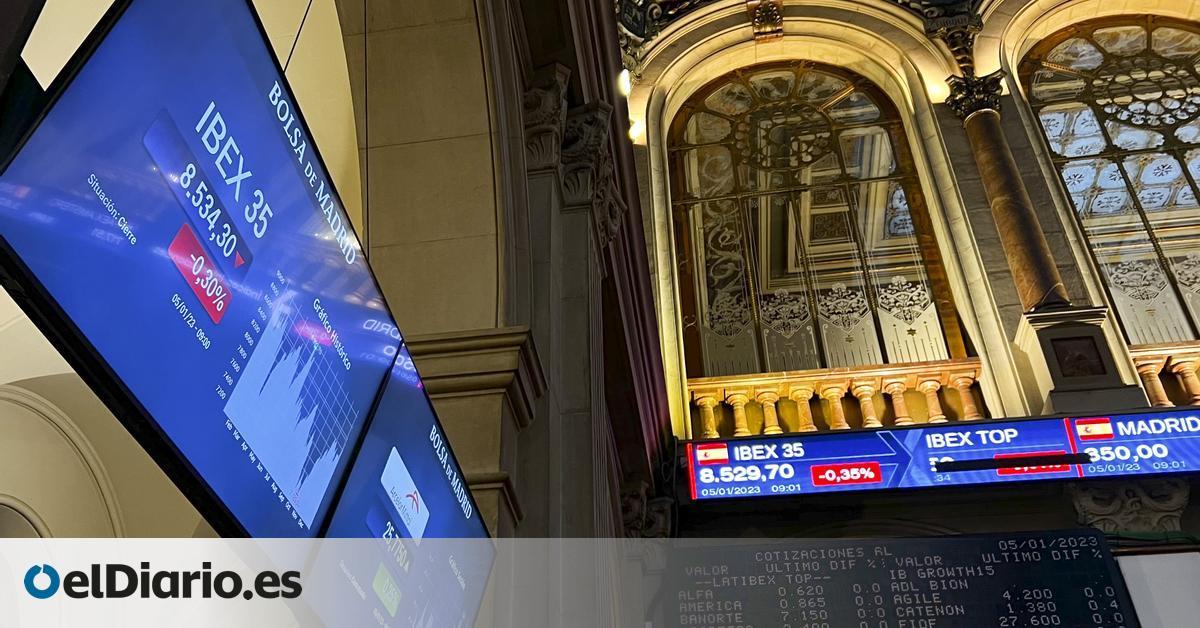
The collapse of Silicon Valley Bank is having an effect on bank prices around the world. Also in Spain. Financial entities are suffering a difficult Monday in the markets with sharp falls that are generating a difficult day for the selective Spanish stock market, the Ibex 35, which fell more than 3% in the first hours of trading, after having confirmed the fall in a second bank in the United States, the New York Signature Bank.
Banks account for six of the 35 stocks on the Spanish stock market, being the sector with the greatest weight in it. This reality had pushed the Ibex 35 to its biggest drop in five months. Although, the situation has softened as the trading session progressed towards a more moderate fall, although equally significant.
All banks are leading the stock market crash in Spain. Sabadell, which came from being the star value of the bank in the last year, is now the most punished with a collapse that exceeds 11%. It is followed by Santander, with a drop of 8% and Bankinter, which drops 7.8%. CaixaBank, Unicaja or BBVA fell between 6.2% and 7.2% on the Stock Market.
The panorama that is drawn in Spanish banking is the one that is being seen in the rest of the European banks. In the case of the Italian banks, when the first two hours of trading were exceeded, the titles of Bper Banca left 8.70%; those of Banco Bpm 7.84%; UniCredit 6.79%; FinecoBank 6.80%; Intesa Sanpaolo 6.63% and Banca Mediolanum 5.76%.
On its side, among the banking entities that are part of the Dax of the Frankfurt Stock Exchange, the Commerzbank titles yielded 11.35% and those of Deutsche Bank 6.40%, while in the Cac 40 of the Stock Exchange Paris Société Générale shares lost 5.74%, while BNP Paribas lost 5.51% and Credit Agricole 4.28%.
Other large European banks such as the Dutch ING Group and ABN Amro were also affected by the uncertainty and fell 7.43% and 6.39%, respectively, while the Austrian Erste Group and Raiffeisen lost 6.57%. in the case of the first and 4.98% in the second. On his side, the Belgian KBC left 6.27%.
Outside the European Union, on the London Stock Exchange, the shares of the Standard Chartered bank lost 5.65% of their value in the first hours of trading, while Barclays lost 4.90% and Lloyds 3.57%. . In the case of HSBC, the shares of the largest European bank by assets fell more than 4%, after the entity acquired the British subsidiary of the SVB for one pound sterling. In turn, the Swiss bank Credit Suisse suffered a new correction by falling 10.42% to trade at 2.25 francs per title, after falling more than 15% at the beginning of the day, while the price of UBS suffered a decline of 6.10%.
The opening of the market in New York has meant that the falls that were being seen in Europe are being replicated among US banks. Bank of America, Wells Fargo and Citigroup, three of the main banks in the country reap losses of between 4% and 5%, while JP Morgan has started the day with more moderate drops.
So far there have been two banks affected by the crisis that is sweeping the US, led by Silicon Valley Bank. The banking group has collapsed due to the losses generated by the management of deposits after the rise in interest rates. A second entity has been dragged down, the New York Signature Bank. Another bank with similar characteristics, First Republic, has been affected by falls of more than 60% before the opening of the US market.
Following the sale of the British subsidiary of Silicon Valley Bank to HSBC, the German Federal Financial Supervisory Authority (BaFin) has imposed a moratorium on the bank’s company in the country due to the risk for the fulfillment of obligations with creditors and has ordered the closure of the clients of the branch in the country of the failed US bank, stressing that it has “no systemic relevance”.
In this sense, BaFin has recalled that the German branch of Silicon Valley Bank has been operating in the country since May 2018 in the loan business, but not in the deposit business, for which reason it has stressed that the moratorium implemented “has no consequences for the deposit insurance in Germany. According to the annual financial statements as of December 31, 2022, the entity’s total assets amounted to 789.2 million euros.
“The German branch of Silicon Valley Bank is not systemically relevant,” BaFin said, adding that the difficult situation of the German branch of Silicon Valley Bank “does not represent a threat to financial stability.”
“Probably” no loss in Europe
The Moody’s agency considers that European banks “probably” will not register losses in their bond portfolios in the face of the turbulence in the banking sector unleashed by the situation of Silicon Valley Bank (SVB).
The strong rises in interest rates have caused the market value of the bond portfolios in the hands of European banks to drop “considerably”, but, for large entities, these losses will be “temporary” and “moderate”, and for smaller banks, dependent on the deposits of their clients, these will be “loyal” and will wait to recover the initial value, says a report published by the rating agency.
Moody’s believes it “exemplifies” how sudden loss of confidence and accelerated cash outflows from deposit bases can force a bank to sell assets at a discount that results in “heavy losses” on its balance sheets and investments.
ECB sources consulted by elDiario.es have refused to comment on the possibility of an extraordinary meeting or decision as a result of the impact on the large European banks of the collapse of Silicon Valley Bank. inform Daniel Yebra.
Funds from Sweden and Norway affected
The Swedish pension fund Alecta and the Norwegian sovereign wealth fund have been two of the European financial players that have been implicated in the collapse of Silicon Valley Bank. Swedish supervisors have called Alecta, the country’s largest pension fund, to a meeting to discuss its positions in the banks that have collapsed. He was the fourth shareholder of SVB, but he was also among the largest investors in Signature Bank, the other entity that has been intervened. In addition, he is also present at First Republic Bank, the group that has collapsed before the opening of the market, indicated as the possible new affected. In all three, Alecta has 2,000 million dollars, slightly less than 1% of its total assets.
The Norwegian sovereign wealth fund, which manages investments with capital obtained from oil, has said it aims to recover part of its exposure to the collapsed SVB. However, he considers that it is “premature to say how much.” “We are closely monitoring the market situation,” said a spokesperson for the fund, quoted by the Financial Times, confident of recovering “some money.” He had $160 million in assets and $103 million in bank bonds. He also had a residual position in Signature Bank.
Source: www.eldiario.es

